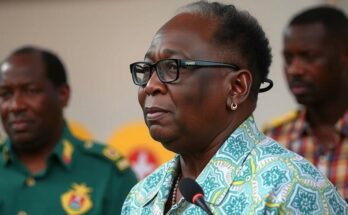Uruguay will hold presidential elections on Sunday amid significant societal challenges including crime, child poverty, and an aging population. Current President Luis Lacalle Pou cannot seek re-election, leading to a contest between his conservative coalition and a moderate leftist alliance aiming to return to power. The outcome will impact domestic reforms and international trade relations, especially with China.
Uruguay, a small yet stable democracy in South America, is set to hold elections on Sunday, where voters will select a new president. With a population of 3.4 million, the political discourse is characterized by civility and a policy-focused approach, contrasting sharply with elections in other regions, notably the United States. Current President Luis Lacalle Pou, aged 51, is ineligible to seek re-election due to constitutional term limits. The election results will play a crucial role in determining whether his conservative coalition will maintain power or whether a moderate leftist alliance, which previously governed from 2005 to 2020, will make a return. This leftist coalition is known for its pivotal reforms, such as legalizing marijuana and advancing green energy initiatives. The candidate from the opposition, Yamandú Orsi, has indicated that a victory would likely stall a potential trade agreement with China, as he prefers to navigate negotiations via Mercosur, a regional trade alliance. The forthcoming president will face significant challenges, including an aging demographic, high child poverty rates, and an uptick in violent crime, with drug trafficking becoming increasingly prevalent in what has been one of the more peaceful nations in South America.
The forthcoming presidential elections in Uruguay occur amid pressing societal concerns and demographic shifts. Voters will weigh issues such as rising crime rates, a significant child poverty crisis, and the challenges of an aging population. Uruguay is often regarded as a bastion of democracy in a region mired in political instability. In previous decades, the country experienced a leftist government that introduced noteworthy reforms, which have shaped its current political landscape. The importance of this election is accentuated by the current administration’s inability to pursue a re-election due to term limits. The outcome is expected to influence future foreign relations, particularly with China, given the competing diplomatic strategies of the candidates.
The upcoming election in Uruguay represents a pivotal moment for the nation’s political future. With significant issues such as crime, child poverty, and an aging population at the forefront, the decision made by the electorate will carry profound implications. One candidate seeks to continue the conservative approach of the current administration, while the opposition proposes a return to a more progressive stance that prioritizes social reforms. The outcome will not only affect domestic policy but will also shape Uruguay’s international relations, particularly concerning trade deals with major partners like China.
Original Source: www.nytimes.com




